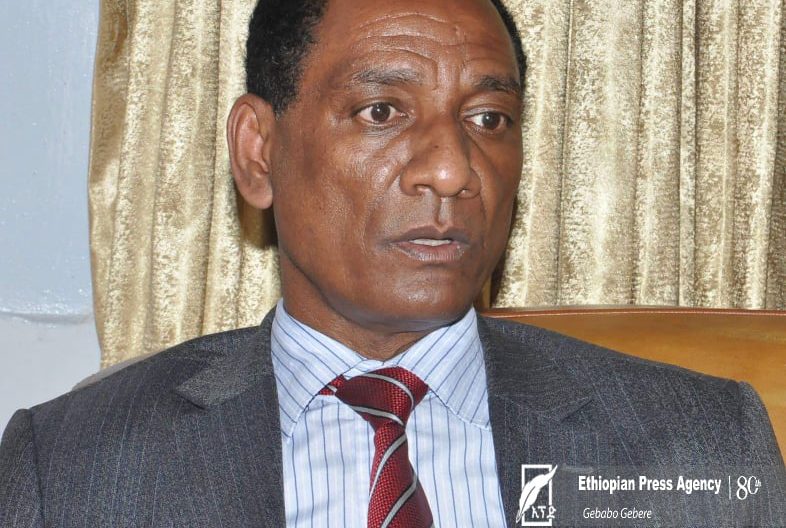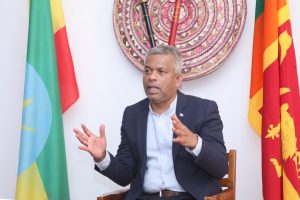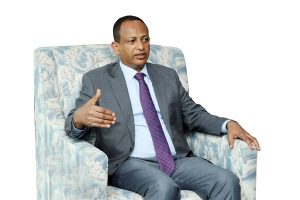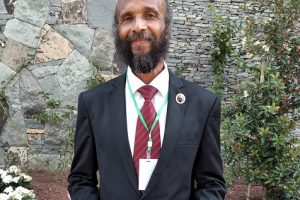
Today’s Guest Kasahun Folo was born and raised in Oromia State. After he received a diploma in surveying he worked in the Oromia Rural Road Authority which changed its name to Oromia Construction Corporation. After serving the authority for two years as a surveyor, he came to Addis Ababa to get a better job. He then studied law and gained his first and second degree from Civil Service University. He had a chance to engage in trade unions finally becoming the President of the Confederation Ethiopia Trade Union. The Ethiopian Herald had interviewed Kassahun on the role of the Union in ensuring employees’ rights and benefits as well as activities of the union in major national political agenda. Excerpts:
When and why was CETU established?
Confederation of Ethiopian Trade Union was established on April 11, 1963, by 29 trade unions with a vision of protecting the rights and benefits of workers and setting up labour unions to do the latter. Apart from strengthening the unison which was previously established, the confederation works to create effective industry relations between employees and employers. It also works for the country’s economic growth, social affairs development and building democratization etc. It also works together with right based organizations at national and international level as the workers right is part and parcel of human rights. It also works to ensure the health and job security of the workers.
Would you tell us the challenges CETU has been facing so far?
The challenge observed in public enterprises is by far better than private enterprises. Workers can easily negotiate with local investors. However, big problems have been seen in foreign-based companies as most of them do not allow the existence of workers association as a whole. If there are some organized associations, they work to dissolve them. Even if we return the association by the order of courts, they are not ready to negotiate with workers. When they are forced to negotiate, employers delay the negotiation as they have no desire to build excellent relations.
Even if they are forced to negotiate with their workers; they have no desire to apply the resolution. They rather retaliate against workers who raise the issue of establishing workers associations. And the workers were discouraged from doing so. Thus, we will take the issue to the court. The salary of workers in private organizations is too minimal. I have no words to explain it. 750 Birr is meaningless as the cost of living rises. Thus, we are working to
improve this.
The confederation was there for about 57 years. What changes does CETU bring about to Ethiopian workers?
The changes that have been brought in this regard vary from time to time. During the reign of Emperor Haile Selassie I, some people struggled for the rights of workers. By then, it was hard to establish a labour association and the problem still exists. By the way, as the request of workers is continual, ensuring the rights and benefit of workers is not a one-time agenda resolved once and for all. The desire to establish a labour union and trade agreement are incessant. As it is the issue of benefit, there is always confrontation between employers and employees.
Thanks to those who struggled for the right of workers; the Ethiopian constitution has recognized the right of assembly and organization of workers. This is not an easy task. The rights of workers were promulgated in various laws.
In the Derg regime, there was Ethiopian Workers Party. During the regime, workers are not using the party to claim their rights. It was an entity that served as a channel to transfer various directives to the Ethiopian workers. As we all know, Derg hailed from the military rather than [civil] workers. Ethiopian Labor Association was executing issues of the government but it does not stand for the right and protection of workers’ rights. However, job security was not a problem. Thus, it is difficult to separate a party’s role from that of the government. According to proclamation 6468, people who graduated from universities had a chance of getting a job with certain limited benefits. However, there was negotiation at all as workers were not requested if they had the interest to be a member of trade unions. By then, protecting job security was not an easy task.
Over the past 27 years, the free market system was introduced. In the system, employees and employers stood for their rights. Trade unions were not dependent on the government. In this process, various tasks were accomplished. For instance, when proclamation 4285 was enacted, our members struggled to make the law conducive for workers. To be frank, it was good in terms of respecting workers’ rights. When proclamation 366/96 was revised, our leaders had been playing a crucial role via making due participation when laws were formulated. In connection with this, for instance, Dawi Ibrahim, Former President of CETU was forced out of Ethiopia due to the struggle he made with the government to respect the rights and benefits of Ethiopian workers. Though he was forced out of Ethiopia, the struggle of workers never stopped there.
Employees of private enterprises were not entitled to pension fee upon retirement. After the struggle we made, they are now receiving pension-like government workers. The other point is that the salary tax laid on the government workers was too high. We can minimize it even though it did not
improve as to the level of expectations. This means, on the other hand, every worker has got an eight per cent salary increment. This does not mean that it is enough.
Social Health insurance law is also enacted but not enforced as the nation cannot provide health insurance coverage to workers and their families.
CETU is also striving to put the least salary of workers in Ethiopia via conducting a study in it and hiring international consultants. The other concern is ensuring job security and creating a healthy environment. About this, Organizations are fined repeatedly in connection with ensuring safety but the punishment did not stop the death and injuries of workers. The proclamation was revised providing special attention to workers safety. And now if the organization makes the same mistake repeatedly, the proclamation puts shut down the companies as final punishment. The punishment may alert employers to ensure safety.
The confederation is effective in pressurizing the government to enact a law that protects the rights and benefits of workers. Why is it failing in terms of forcing the execution of laws, regulations?
First, CETU has no right to implement laws but it fights back for the presence of better laws. As other bodies are responsible for that we ask them to enforce law representing workers. If a given institution fires workers, we try to return that worker negotiating with that company. If it is not possible, we take the issue to the courts. Thus, the law execution body is the Labor and Social Affairs Minister or Bureaus at the city level. If this is not effective, we encourage labour forces to carry out peaceful struggle. For instance, terminating the job is the final option of workers to pressurize the employer to change its stance. However, unless it handles carefully such sort of action may be ineffective as the employer hires others using his right.
Some people said that CETU is not an entity free from the influence of the government? What is your reflection?
At this time, the confederation is an independent entity. However, this does not mean that the government is not interfering in it. This organization is accepted internationally. The information released from the organization is accepted by other bodies. When I came here, for instance, the Ethiopian Teachers Association leaders asked me at the assembly hall to conduct a meeting. I allowed them to use the assembly hall. The government officials called and told me that the team led by Dr Taye was making preparations to establish another teachers association.
The then security forces ordered me to take the key to the assembly hall. I asked them to order me through a letter but they did not want to do so. Later on, the issue reached the prime minister’s office and he ordered the security forces to prohibit the participants of the meeting from approaching the assembly hall. With this, they couldn’t conduct the meeting. They also interfere in other issues; the leaders of labour unions were arrested and killed.
There are such sorts of interference not to do your job freely. Even with the federation, we fired workers who violated the law and procedures sealing workers money and isolating workers’ unity. Here, the government officials interfere in our administrative tasks and try to force the federation to return the worker to his former position. There has been interference anytime, but we don’t support the government’s stance.
CETU is toiling with the government as per the principle of ILO. The three parties (the government, employer and employees) should work in the Tripartite Advisory Board. Whether you like it or not, this principle advised you to work with the government. This does not mean that you are not independent. Whatever type of government it is, you are forced to do with the government which holds power. We are not an entity established to overthrow the government. If the government violates our rights, we stand together to respect our rights.
Let me take you to the election and related issues. As you know, Ethiopia has been preparing to conduct the 6th general national election. What is CETU’s preparation to discharge its observatory role?
As CETU, we have been making preparations earlier than other civic organizations. We passed a decision last year after deliberating on what would be the contribution of the confederation in terms of making the election fair and peaceful. After deliberating on the issue with the association, we prepared draft documents. Accordingly, we have three options. These are; choose and support one party, establish our party but it is difficult to do so and play an observatory role taking an independent position. If we choose one party, it will dissolve CETU as a member interest is different. We then decided to be independent of any other party after taking lessons from the best practice of other countries.
Primarily, we thought to deploy 5,500 elections observers throughout the country. First, we did not get permission from the National Electoral Board of Ethiopia (NEBE) to prepare project proposals for ten organizations. Accordingly, some organizations based in America and the EU are not interested in providing support. We were then forced to minimize the number of observers to 1360 and provided voters education for them. To create a platform for political parties, we are making preparations to do it soon. And we observed the pre-election process in some selected polling stations as well as dispatching observers to some areas as the final election report included the pre, during and post-election processes. We identify the place our observers are engaged in.
As a civil society organization, how do you compare it with previous elections?
What differentiates the 6th election from the previous election is the presence of competitive political parties. It is difficult to consider the previous election as an election except for the one that took place in 2005. Afterwards, as they have no chance to compete with the ruling party, political parties have lost appetite to participate in the election. As it gives options for the people, the existence of contending political parties’ is critical. If there are several parties, citizens can get the option to choose the best. The previous elections cannot be compared with the upcoming election.
What civic societies should do in terms of making the upcoming election free, fair and democratic?
I think civil society organizations should be independent. They also work on their members at the grassroots level. We have to take care of post-election issues. We have to stop throwing stones and have to accept what the election board declared. The loser should transfer the position peacefully and if the other side has grievances, it has to present for the concerned bodies following the legal procedure. However, civil societies should not be a tool for one party. We have to solve any problem with pertinent solutions but not create another problem. Civic society should awaken its members. They should not support any party.
Do you have a message to countries that tried to pressurize Ethiopia not to conduct peaceful elections interfering in the national issues?
An election is the internal affairs of a given country. It is difficult to interfere in local issues such as elections as the country is a sovereign one. On the other hand, some countries don’t want to send observers. The Observer is a witness for the election. The main thing is found in the hands of the people. It is the people who have the right to elect their leaders. Witnesses can be local or international entities and evaluate whether the process of election is democratic or not and suggest for the improvement of the coming election. There may not be perfect in the election. As we are beginners, we face difficulties. So we should not bother with this.
You are now secretary of the Horn of Africa confederation trade unions. What is CETU’s engagement in East Africa, Africa as well as international level?
CETU is a more prominent organization internationally than locally. We are a member of the World trade unions confederation. We paid all the necessary contributions expected from us and they assisted us. CETU is one among five strong confederations in Africa equivalent to South Africa, Tanzania and Kenya. In 2018, for instance, at the international trade union confederations summit, Ethiopia was one among the three countries chosen to present its experience in organizing trade unions. In Africa, International trade union confederation for Africa (ICTU), we are participating there taking the deputy chair position. We are participating there representing 14 African countries. We also established the Horn of Africa confederation Trade Unions and became General Secretary as the office is found in the heart of Ethiopia, Addis Ababa. Free movement of people through ensuring peace and security, reducing the rate of poverty and migration are some of the concerns we are working with together with IGAD. Let alone in the aforesaid issues, the horn countries should work together to come out of the vicious cycle of poverty as their people are intertwined in ethnic identity.
Thank you very much.
It is my pleasure
BY GIRMACHEW GASHAW
The Ethiopian Herald 29 May 2021




